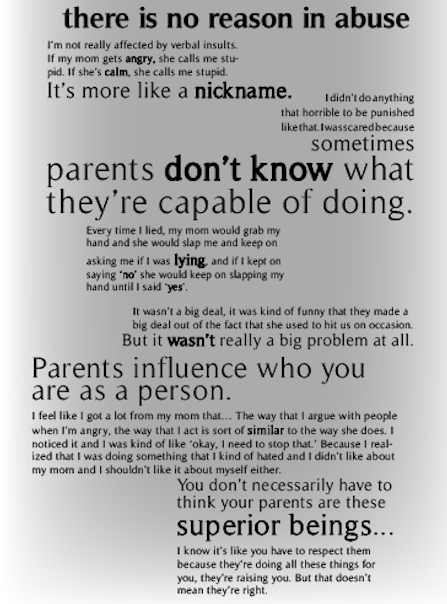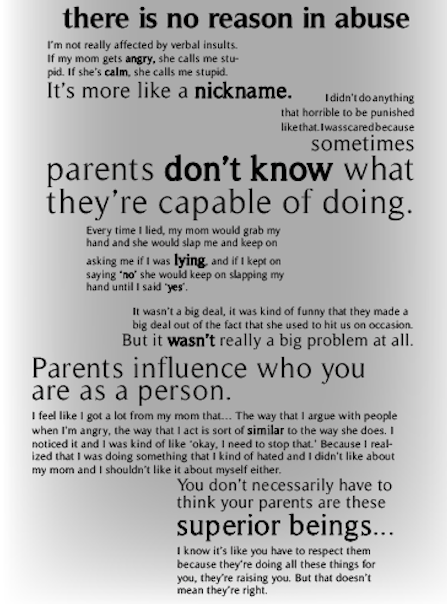Reported by Varsha Venkat and Mingjie Zhong.
For some students at MVHS, the stories here were, at one point, ones of everyday life. For others, they still are. A bad grade equals being knocked on the head. A half-told truth means being slapped on the hand. A frustrated parent means that there will be screaming. Things will be thrown and tossed across the room. There will be no silence.
The stories here expose the private experiences of various students and reflect on how different individuals believe in different definitions of abuse. Some students believe their experiences with physical discipline are entirely normal. Others consider their experiences abuse.
In order to ensure their safety in our community, these students spoke with El Estoque on the condition of anonymity. Please respect their privacy.
Stream of discipline
One sophomore girl said that she is rarely physically abused at home; nearly all disciplinary practices in her home are verbal.
Yet she still remembers clearly the one time her father threw a television remote at her in an outburst of anger.
The sophomore elaborated, recalling that when she was in fifth grade, she threatened to kill a child and his family if he did not pass her the ball on the playground. Her father, upon hearing of her misconduct, grew infuriated.
“My dad got mad [while] watching television, and he was too lazy to get up so he threw the TV remote at me,” the sophomore said.
Wooden spoons and phone books
Another sophomore recalls that whenever she lied, earned a bad grade or misbehaved, she would be spanked — sometimes with a wooden spoon. When she fought with her older brother, the two were both punished; they had to hold a phone book over their heads for a certain amount of time without dropping it. If she dropped the phonebook, the punishment time would reset and she would have to start over. In middle school, whenever she received bad grades, her mother would knock on her head asking: “Hello! Is there any brain in there?”
Although the discipline would hurt, it was never excessively painful. As a result, the sophomore believes physical discipline can be useful.
“I think physical discipline — not abuse, but physical discipline — does create mannerful kids,” she said.
However, she believes that there is a difference between discipline and abuse.
“In discipline, the kid has to know that there is a reason for the punishment, and they have to understand the punishment,” she said. “But there is no reason in abuse.”
Called to school
One senior was abused by her mother when she was in elementary school. Her mother used to hit her and her brother when she was frustrated with them for things like not cleaning up, not being quiet or not sleeping when she told them to.
The senior always cried quietly when her mother abused her. She said talking back would only aggravate her mother even more.
But her pain did not go unnoticed.
“I started crying in my third grade class […] My teacher had asked me, ‘Have your parents ever hit you?’ And I told her, ‘Yes, my mom does hit me,’” the senior said. “It wasn’t a huge thing; I was never beaten with the intent to physically harm me to the point where I couldn’t move. My mom got called into the office… I don’t know what they said to her or talked to her about, but she got into trouble for me talking and saying that she hit me.”
According to psychologist Maxine Becker, if a student is undergoing domestic abuse at home and there is no intervention, the abuse a student is facing can become worse. In the senior’s case, her mother stopped physically abusing her following the meeting at her school. However, her mother recently began verbally abusing her after the senior failed a semester of a class.
This time, she decided to stand up to her mother and talk back.
Psychologist Marilee Ruebsamen said that there are many reasons for why students stay in abusive relationships, including the power dynamics at play in the household. The senior never believed that she was in a seriously abusive situation, so she did not consider seeking help. Now, she even finds it funny that her teachers made a big deal out of the fact that her mother used to hit her on occasion.
Her friends’ perspectives of her mother changed completely when they found out about the abuse that she faced. They had always considered her mother to be a nice person, and were even more shocked because they did not experience a similar disciplinary action at home.
Although the senior feels differently about the situation now that she is older, she is adamant that she should not develop the same enraged behavior that she saw in her mother.
“The way that I argue with people when I’m angry, the way that I act is sort of similar to the way [my mom] does,” the senior said. “I noticed it and I was kind of like ‘Okay, I need to stop that.’ I realized that I was doing something that I kind of hated and I didn’t like about my mom, and I shouldn’t like it about myself either.”
Family dynamics
One sophomore believes that family roles tend to play a part in how extensively physical discipline is used. The sophomore’s mother is stricter than her father, and the sophomore believes this to be a result of how much each parent was disciplined when young.
“Because my mom was an only child, a lot of my grandparents’ attention was put onto her… they wanted her to become ‘the perfect child’ since they only had one,” she said. “My dad — he was one of the younger [siblings], and a lot of the attention was put onto my uncles and aunts since they were older.”
As the older sibling in her family, the sophomore believes that parents are generally stricter with the older sibling since the older sibling is a role model for the younger sibling.
“Whatever [my younger sister] does wrong is pushed off to me and I get disciplined, because I’m the one in charge of her,” she said. “It’s automatically my mistake.”
Yet another sophomore says the situation in her family differs. As the younger sibling, the sophomore’s mother had higher expectations for her, as compared with her older brother. Because the sophomore’s brother did not do extremely well in high school, she believed her mother’s high expectations fell upon her.
“When I bring home an A-, [my mom] is like, ‘What is this? What is this?’” the sophomore said.
Tradition in generation
A sophomore girl describes that she initially felt resentment and fear towards her parents whenever she was punished physically. Her parents would hit her on the hand continuously whenever she lied, until she admitted she was lying.
“At first, I felt really angry and scared because with the anger I felt like I didn’t deserve it; I didn’t do anything that horrible to be punished like that,” the sophomore said. “I was scared because sometimes parents don’t know what they’re capable of doing… if they’re really angry, they might go beyond their boundaries and it might be really dangerous. But I think that’s how they were raised… so now they’re putting their own generation’s ways onto me, and that’s how they will raise me.”









